GOVERNMENT LOBBYING WITH MILTOS GOUDAMANIS | E002 PODCAST
LISTEN TO THIS EPISODE ON ALL STREAMING SERVICES
ABOUT THE GUEST
Miltos Goudamanis sits down with George Stroumboulis to discuss the business of Global Advising.
Miltos (Militiades) Goudamanis is the CEO and Founder of Global Strategies Council (GSC). As a distinguished government and business lobbyist, Miltos has led GSC to become a premier global advisory firm, collaborating with Heads of State, CEOs, Leaders, and Senior Officials during periods of global change and unrest. His expertise extends into the realms of security and crisis management, where he has earned a world-renowned reputation for his strategic counsel.
Miltos Goudamanis is not only a savvy lobbyist but also a recognized global player in the field of energy. His contributions and leadership have garnered acclaim, making him a key figure in navigating the complexities of the energy sector on the international stage. Join us in this episode as we delve into Miltos Goudamanis' multifaceted career, exploring his invaluable insights, experiences, and the strategic counsel that has positioned him as a prominent influencer in the spheres of government, business, security, and energy. Miltos holds a postgraduate degree, Master of Science in business administration and international relations, along with a Bachelor degree in marketing.
WEBSITE: https://www.globalstrategiescnl.org/miltos-bio
LINKEDIN: https://www.linkedin.com/in/miltos-goudamanis-m-sc-126350a
CONTACT: https://www.globalstrategiescnl.org/contact
“Lobbying outside of U.S. is not allowed. It’s a terminology that we use here in U.S. whereas everybody else they don’t use it because it’s illegal.”
MEDIA RELATED TO THE EPISODE
George Stroumboulis discussing with Miltos, understanding the difference between Lobbying and Advising on a global scale.
Miltos Goudamanis detailing his career and stories worth noting.
George and Miltos chatting in the California studio.
ABOUT THE “INVIGORATE YOUR BUSINESS” PODCAST
The Invigorate Your Business with George Stroumboulis podcast features casual conversations and personal interviews with business leaders in their respective fields of expertise. Crossing several industry types and personal backgrounds, George sits down with inspiring people to discuss their business, how they got into that business, their path to the top of their game and the trials and tribulations experienced along the way. We want you to get inspired, motivated, and then apply any advice to your personal and professional lives. If there is at least one piece of advice that resonates with you after listening, then this podcast is a success. New episodes weekly. Stream our show on Spotify, YouTube, Apple, Amazon and all other platforms.
ABOUT GEORGE STROUMBOULIS
George Stroumboulis is an entrepreneur to the core, having launched several ventures across multiple industries and international markets. He has held senior-level positions at progressive companies and government institutions, both domestically and internationally, building an extensive portfolio of business know-how over the years and driving profit-generating results. George’s ability to drive real change has landed him in several media outlets, including the front page of the Wall Street Journal. George was born in Toronto, Canada to his Greek immigrant parents. Family first. Flying over 300,000 miles a year around the world puts into perspective how important family is to George’s mental and emotional development. With all this travel to global destinations, the longest he stays even in the most far-out destination is 3 days or less - a personal rule he lives by to make sure he is present and involved in family life with his wife and three daughters. To read about George’s global travels, stay connected with his blog section.
STAY CONNECTED WITH GEORGE STROUMBOULIS
STREAM & LISTEN TO THE PODCAST:
SPOTIFY: https://open.spotify.com/show/1rW2CmxQoiJNEPOZupJlvd
YOUTUBE: https://www.youtube.com/user/Stroumboulis
APPLE iTUNES: https://podcasts.apple.com/us/podcast/invigorate-your-business-with-george-stroumboulis/id1607693240
AMAZON MUSIC: https://music.amazon.com/podcasts/8fc03929-71b3-483a-a64e-153e30b3d462/invigorate-your-business-with-george-stroumboulis
iHEARTRADIO: https://www.iheart.com/podcast/269-invigorate-your-business-w-92187370/
STROUMBOULIS SITE: https://www.stroumboulis.com/podcast
PODCAST SITE: http://www.invigorateyourbusiness.com
OTHER SERVICES: GOOGLE, PANDORA, OVERCAST, CASTRO, CASTBOX, PODFRIEND, PLAYER.FM, PODCASTADDICT, PODCHASER, PODCASTINDEX and RSS FEED.
FOLLOW GEORGE STROUMBOULIS:
INSTAGRAM: https://www.instagram.com/georgestroumboulis/
YOUTUBE: https://www.youtube.com/user/Stroumboulis
LINKEDIN: https://www.linkedin.com/in/Stroumboulis/
TWITTER: https://twitter.com/Stroumboulis
FACEBOOK: https://www.facebook.com/georgestroumboulis
TIKTOK: https://www.tiktok.com/@georgestroumboulis
CONTACT GEORGE DIRECTLY: https://www.stroumboulis.com/connect
FULL SHOW TRANSCRIPT
George Stroumboulis: Today I sit down with someone who negotiates in hostage situations. Helps leaders around the world achieve their business goals and brokers deals with Government Officials. Enjoy this episode of Miltos Goudamanis, CEO of Global Strategies Council in the Business of Senior Advising.
George Stroumboulis: Very excited to sit down with you. Since like the first day I've met you, I've just been blown away with just your background. You know how modest you are but how much you have done while you've been here, and you know just your background. You're the CEO and Founder of Global Strategies, which is a global advisory council. You sit down with executives, CEOs, industry leaders, C-level people and you just make a lot of amazing things happen. So, you just give us a little background on what you do.
Miltos Goudamanis: Perfect, thank you George first of all. I'm very happy that we have this initial discussion. I would say definitely. My name is Miltos Goudamanis. Global Strategies Council - a company that we actually started as a concept and then it became more serious. I would say we started back in 2010 but officially officially 2012, I would say. We registered as a Texas corporation and then we did like more like a California-based and then we expanded. It's a company that maybe in U.S. they call it a lobbyist firm, but we are more like a senior advising firm.
George Stroumboulis: Okay.
Miltos Goudamanis: In other countries, they call it investment advisors, in other countries they call it business development.
George Stroumboulis: Yeah.
Miltos Goudamanis: So, we're trying to be all of the above pending the cases that we take on.
George Stroumboulis: Okay. Do you get offended or bothered with the term "lobbyist"
Miltos Goudamanis: I guess I would say yes because I was born and raised in Greece. Moved to the U.S. 30 years ago but again I'm still traveling a lot and I'm saying that because "lobbyist" outside of U.S. is not allowed. It's a terminology that we use here in U.S. whereas everybody else they don't use it because it's illegal.
George Stroumboulis: It's illegal, right.
Miltos Goudamanis: So, but definitely lobbyist is a good, I would say word for the U.S.
George Stroumboulis: Okay, that's a great way of putting it. So, someone reading this today or listening to this today from the U.S. and they want to be in the lobbyist game, or the senior advisor game, you don't just wake up one day and say I want to be a senior advisor and bring governments together, bring executives together. How do you go at the age that you are today, being in a position to literally sit down with government officials and introduce different business concepts? How do you go from that? Was that always something you wanted to do when you were young to be in the senior advisor game? How does one get into the space?
Miltos Goudamanis: You know it started I would say, yeah, you go to the Universities. I went to university here, at college actually, in San Diego. Graduated, did my master’s but through all these times I was getting involved with different projects. I remember even leaving time from the University to fly and meet some people getting exposed out there. And that is why the one thing brings the other thing. The one meeting will bring two other, if not five other meetings. To become a senior advisor, it requires a lot of traveling and a lot of sacrifices. So you have to have it inside in order to do that. A senior advisor is not going to just wake up and say I want to be a senior advisor. You're going to get exposed out there and the crowd will pick you because you have a lot of choice I would say. Especially nowadays with the social media, everybody knows who you are what you do.
George Stroumboulis: Sure.
Miltos Goudamanis: So, I guess it was not a choice I would say. It was maybe the beginning a little bit of a choice but then you become an expert and they come after you.
George Stroumboulis: They come after you. And do you feel where you're at today, do you keep getting stronger and better? Meaning five years ago, your power, your connections just keep getting stronger as you grow?
Miltos Goudamanis: Yes. I mean my, our goal is like we really trust, and we believe and build teams. As long as you do that model, I would say you'll be successful, and you'll go further. You need to let it go on everything, you need to let it go of not being one person, to be a team person. Same thing with the business. If you see one business is better than the other one, you need to let it go and really do the business that you really think you can do. Same thing goes with the advising. When we really take on on different companies and advising them for expansions in different places, we see what is better to take on and let it go what they had before. So, it's a challenge but it's a good challenge.
George Stroumboulis: Yeah. So let me ask you in your position, advice right, we want to give the listeners advice. What are some things when you sit down and you see some novice, or younger, or inexperienced advisors in the room, what are some things that you see, and you could see right through it? Things that you shouldn't do when you're on this scale. Because you have to tread lightly and delicate, right, with all these groups. Are there any things that stick out that you know you should avoid? You know, like people being too eager or trying to...
Miltos Goudamanis: Yes. I mean number one; I know I don't want to sound materialistic; I will see what they wear.
George Stroumboulis: Okay.
Miltos Goudamanis: Not the quality, or if it's a specific brand. It's how they put themselves and how they got dressed that morning, that they walk into the meeting. This is for me number one because you see if you are like presentable this is how you're going to do your business. And of course, it's not going to be from the first time because if you're going to work with somebody you're going to see him again and again and again, or her, and you will know if they are stable of how they get dressed or what they do. So that's my number one.
George Stroumboulis: Number one.
Miltos Goudamanis: Number one, I'm going to check how are they addressed and again I'm not looking for brands. The way that they offer themselves together. Exactly right. Right.
Miltos Goudamanis: Number two. Definitely, I want to see who is really jumping in the questions or who is really keeping quiet and sitting back.
George Stroumboulis: Is one favorable over the other, like when you're faced with that?
Miltos Goudamanis: It depends on the subjects I would say.
George Stroumboulis: Okay.
Miltos Goudamanis: Sometimes, if you're like too quiet, which I've seen in my case, it's not a good thing.
George Stroumboulis: Okay.
Miltos Goudamanis: It's good to do the mistake, as we know you do mistakes, you learn, you make mistakes, you learn again and again. Definitely, participation is an important thing but also participation and sharing. I want to see how they will react when we're sitting with the crowd. Do they accept what George is going to say?
George Stroumboulis: Okay.
Miltos Goudamanis: What Miltos will say. So those three elements will make if it's good. Presentable, acceptable and a team player. This is what really matters to me when I sit with
George Stroumboulis: Those are the first three things, which is great feedback to know. You know, and...
Miltos Goudamanis: You're doing great by the way.
George Stroumboulis: Yeah, no I appreciate it. And look, I'm feeding off you. Even knowing that, this this is, this is really good. So, the one thing, it's obviously public information but we want to talk about what are some things in your life, professionally, that was just "wow". I'm amazing at what I do, right, like this happened and I know I get paid a fee and I deserve it because I'm damn good. And then what was something that happened in your career where you're like $hit. I really you know, f#cked this up, or I really need to improve. Can you give us an example of each? Because I want to talk about a notable achievement as well.
Miltos Goudamanis: Yes. I will try to be, I mean probably comfortable of what I'm going to say. A couple of cases I would say, one was setting up in Brazil a whole, we've been requested from a specific Government or Governor at a territory there to do a whole LNG infrastructure. The whole plan. Regasification plans, it was very important for the country to set it up. So, for me I think was a good element because we had to play especially in certain countries between the federal and the state. Which is complicated and although maybe you have a state energy company that does not so much open to the federal, the public companies, so had to be in the middle of it and at the end everything worked out perfect. So, I think it's a good achievement.
George Stroumboulis: And where were you age-wise in relation? Does age play a big factor?
Miltos Goudamanis: Yeah, it does i would say. Well, yes and no. But uh I think we learn from the mistakes the first 15 years.
George Stroumboulis: Right.
Miltos Goudamanis: And then you kind of have a little bit of experience. So, at that time was probably like I would say 12-14 years ago.
George Stroumboulis: Okay. Yes, excellent, and then and then just talking about the good stuff, was there something even personally in your life where you just realized, you learned something from that, that was applied to work?
Miltos Goudamanis: I think every, well every day we learn. I get on a plane, and I see how the guy next to me is. This is a learning lesson for me.
George Stroumboulis: Absolutely.
Miltos Goudamanis: I arrive there is a crisis, there is a bad weather, I learn what I'm going to do in that crisis now.
George Stroumboulis: Right.
Miltos Goudamanis: Where is the whole plane trying to catch another flight, or anything like that?
Miltos Goudamanis: Like every day, is a learning.
George Stroumboulis: Sure. So, I've had the benefit to start doing business with you and I've been on zoom calls, I've been in physical meetings with you in Athens and everything. You have a way of just being able to sit in a room, of different backgrounds, right, lighting manufacturing, you know, shipping, finance, government officials, and what you're able to do and how you navigate, it's very inspiring and cool. Because you read the room and then you're quickly able to speak to everyone. You know it's just it's incredible just being able to do that, so just some feedback. I've always found that impressive.
Miltos Goudamanis: Thank you.
George Stroumboulis: So, one of the main things originally you had talked briefly about, I'm like is this guy for real, and then you start doing some research and research and it's very impressive. Can you talk to us about the Qatar situation, high level because i know a lot of the stuff that you do is very... but you, you know, Miltos was selected to represent a hostage situation with a royal family. How does that even happen? Like how do they even find you because you're negotiating for someone's life, for some loved one. How do you even get yourself in a position? It blows my mind to be in even in that position and selected and be effective, you know?
Miltos Goudamanis: With that specific uh case actually, with other cases, but that case we got like people to hear about us, write about us, because we're under FARA (Foreign Agents Registration Act) so everything had to be accorded to the Department of Justice of U.S. We wouldn't do anything that will break any laws, obviously, but how we started it's all about trusting and loyalty. And maintaining that name for a long time, if not forever. A client, I mean any case if you go to a lawyer or go to a senior advising firm, it's how you're going to see your client and read the actual need.
George Stroumboulis: Okay.
Miltos Goudamanis: Because the people are like distressed, they're completely I would say lost and they're desperate. We have to read, and that's what we do, we read to move away from that desperation and provide what is better for them. The specific case was actually, we got introduced because of our past experiences, we got very close to specific members of the Royal family. There were a lot of meetings about the members of the Royal family, and they picked us. Obviously, we had the whole team of people.
George Stroumboulis: Sorry, what was that timeline? You just listed a bunch of steps. How fast is that happening in this situation?
Miltos Goudamanis: Yes, we like actually discussing about the project, if I want to call it, or the case for probably six to eight months.
George Stroumboulis: Wow, okay.
Miltos Goudamanis: And we're like learning and learning more information and not only that we're coming closer to the family as well to really understand and also to evaluate if they really need our service.
George Stroumboulis: Right.
Miltos Goudamanis: Because it's not just to meet a new case and jump on the case, we're not doing that.
George Stroumboulis: It's your name associated with it.
Miltos Goudamanis: Exactly. Absolutely. We're doing a lot of, if I want to say, research and taking the time a little bit till we decide okay this is a case we want to take on.
George Stroumboulis: Okay.
Miltos Goudamanis: Definitely another cool thing about, okay it's a good case, it's going to generate a lot of profits and income for our company and for our people and on and on. But we always take a step back. We study the case before we take.
George Stroumboulis: Right.
Miltos Goudamanis: hat I would, say past the six or seven months of discussion and of course there was a change in the administration as well in the U.S., which we always are very careful because we always work with a specific case like this obviously with the Department of Justice. At that stage we had to wait a little bit longer to see how the transition will be officially after January. At the same time, we're leaving time to the family to see what will happen with that case. What will happen with the people that were kidnapped?
George Stroumboulis: Right. Right.
Miltos Goudamanis: We didn't want to take a case if we're like in the middle of so many other problems the case has.
George Stroumboulis: Sure sure.
Miltos Goudamanis: So, at that time was more clear the family wanted to really engage with us and that's how we got the contract.
George Stroumboulis: It's impressive and we're going to put up links on this as well with your background and your company and everything.
George Stroumboulis: Advice! You travel a lot. Right, I love traveling. I travel a lot. Obviously, Covid slowed that down. Any tips or advice? Like when you travel to a new city, you know, from the minute you leave your house to go there, you know, from the flight, from the hotels, do you have a procedure you know that you usually follow?
Miltos Goudamanis: Yeah, I do actually. I know it's going to sound a little bit weird for the listeners. I usually pack two days before.
George Stroumboulis: Okay.
Miltos Goudamanis: So, I want to make sure that i have everything packed. I might make some minor tiny changes on my wardrobe, but I do have everything packed...
George Stroumboulis: Ready to go.
Miltos Goudamanis: Yes, because there is always a crisis. There are always last-minute phone calls, zoom call meetings and I want to have peace of mind when I get on the plane. I have everything.
George Stroumboulis: It's all set.
Miltos Goudamanis: Yes. Okay, so then it's like taking a risk and taking the risk is from the time that you really leave your house. Either like getting on your plane and everything else. As soon as I arrive over there, I have my agenda. I don't stay at the hotel. I'll stay at the hotel if I have to do a meeting, but I'm outside. And of course one thing I will do, I will definitely read the latest news on restaurants and places on the specific city because I want to go and see why, what is the new place.
George Stroumboulis: Gotcha.
Miltos Goudamanis: Sometimes I get my clients or our associates of surprise because they don't know about the place.
George Stroumboulis: And then you have that edge, you have that yeah...
Miltos Goudamanis: Exactly.
George Stroumboulis: Yeah, so what are you going to do now the next two to three years that Hilton is renovating?
Miltos Goudamanis: (LAUGHING)
George Stroumboulis: So fun fact. Miltos will stay there months at a time.
Miltos Goudamanis: That's right.
George Stroumboulis: That they're going to rename it to the Milton.
Miltos Goudamanis: Yes, exactly yes. Well funny enough, actually last, when 2021 stayed 134 days just from the Hilton Athens. So that says a lot.
George Stroumboulis: A third of the year.
Miltos Goudamanis: Well, I'm looking a couple other places. I don't want to name the places for advertisement.
George Stroumboulis: Maybe not. No sponsors yet, so maybe let's not share it. Actually, next time you come on we'll have something read.
Miltos Goudamanis: I want to say I was pretty happy with the Hilton. The people were really nice all these years.
George Stroumboulis: Yeah absolutely. Not a paid sponsor Hilton.
George Stroumboulis: So, what would you, today where you're at, what would you tell a 20 year old self. With what you've experienced and now, what advice would you give yourself 20 years ago to stay on this path? Or maybe not? Is there something you would tell yourself?
Miltos Goudamanis: Yes. Never underestimate yourself. Never. Stay, keep up and have a lot of patience
George Stroumboulis: Patience.
Miltos Goudamanis: A lot of patience and trust people. You have to find people and to create a team. You cannot be by yourself.
George Stroumboulis: Do you underestimate yourself at all, even today?
Miltos Goudamanis: I'm trying not to. Sometimes I do.
George Stroumboulis: I feel like it's human nature to.
Miltos Goudamanis: Yes.
George Stroumboulis: You know, second guess or maybe I would have done this exactly... which is also a learning moment as well, right? Let's not do that at the same time next time.
Miltos Goudamanis: Although I'm trying to, every day I would say, not to analyze too much but I do. And it's the fine line where you stop analyzing and going on action. That's the key.
George Stroumboulis: Absolutely. So early on in my career, I would try to get things to a hundred percent. It doesn't exist right? 100% 100%, and that difference from 95% where you think it is, to 100%, could be months and you're missing the boat. Where you know my new company launched six years ago, I'm the 80/20, let me get it to 80% 90%, launch it. Let the market tell you what's good, what's bad. You know, we've messed up a lot, you know, getting things too early. But the good has far outweighed that and even to this day, even with my team, like let's get it to 90%, launch it, they'll give us the feedback. We'll adjust and we'll go. By the time we actually get to production with a product it has to be a hundred percent but from mental, actual purchase orders, I found it very beneficial for us. Now, we're not a doctor. You can't just do 90% of the surgery, right? So, it varies, but that's been you know big in my...
Miltos Goudamanis: But in business, I mean, it's up to the person how much you're going to take a risk. Myself sometimes and I know our accountants all the time are after me because sometimes we say you know what, this is a 51 percent. We have an extra vote, so we have to take off we have to do the project, no matter that it's not 60 or 70 percent. So, I would say at a young age, let them take the risk.
George Stroumboulis: Let them take it. Exactly. Because you don't realize that when you're twenty, you think yes you know it's it's the greatest thing to do.
Miltos Goudamanis: Exactly.
George Stroumboulis: Right and hopefully it works and if it doesn't you still have time to regroup and do it.
Miltos Goudamanis: And keep the respect at all time. Your associates, your family, your friends. This is what will label you in the years to come, who you are.
George Stroumboulis: Absolutely. And I've learned that early on, you know, when you're looking at purchase orders or deals early on, you think I'm going to get rich off one deal. Or I'm just going to go all in, early on. The older you get; you start realizing the value of partnerships and teamwork and being together. It's the long, it's the long game.
Miltos Goudamanis: Right.
George Stroumboulis: Well right now it's like, yeah you know what, you're willing to go a little less on this deal if there's a chain reaction down the road. So, it's always good to see that but you got to get burned and hopefully you realize that but then there's people who are later in their career and they're still trying to get rich off every order, every interaction. That's the other thing you must see a lot of people are just selfish. I'm going to meet this person because it'll benefit me from day one. How do you, how do you deal with people like that? Like when you blatantly see people say, all right I'm going to try to get friends with him because he's going to get me with this deputy, whoever, it's got to be...
Miltos Goudamanis: It depends on the person. I mean myself, maybe we put if I want to say an expiration date for these specific people, yeah but we are very upfront or I'm very upfront. If it's somebody that is going to take me to a certain level or person, we're very clear this is how we're going to work together.
George Stroumboulis: Right.
Miltos Goudamanis: And we maintain that this is what we kept our legacy, if I want to say, all these years. We respect and we let everybody happy, and they know from the beginning what it is for them.
George Stroumboulis: Right.
Miltos Goudamanis: And this is how is the team. Somebody that will take us to a specific meeting they know that is not the owner of the meeting or the company, so as long as you really clear up front and tell them this is your role in a way, and they accept it and then we proceed. If not, we don't even proceed.
George Stroumboulis: No, because the more you go down this path, that's your reputation right. One degree of separation could ruin a lot.
Miltos Goudamanis: And we and we stop a lot of projects because there is no time anymore. There is no time because even if they tell you oh, I want to discuss one new project. If we're like completely full we don't want to discuss anything.
George Stroumboulis: Having him sit with us today is a big deal because he didn't have time. That's what he's trying to say in a nice way.
Miltos Goudamanis: Very good, George.
George Stroumboulis: But the, you know, winding it down and we appreciate your time, how was 2020 for you and then what's the future look like for Global Strategies Council as you go in?
Miltos Goudamanis: 2020 actually was a very good year I would say. But close with actually losing my dad. So it was a kind of like a you know a really bad year uh at the end I would say but I am reborn. Cherish my dad's memory all the time and with my mom of course. I would say 2021, it was a completely new start in many levels, in different projects, in different countries And 2022 it's really taking off.
George Stroumboulis: Awesome awesome. Yeah, and we we've talked, the legacy like the one thing just talking about your father passing. He got to see you in your prime. Your success, right? That's our dream as especially sons to their dads. It's like I want them to see because that's our pride, that's their pride. It's like that that's a blessing and then the future blows my mind. You're operating in dozens of countries. Just keep rocking man.
Miltos Goudamanis: Well, thank you. Thank you. well actively we're like in four countries but of course yeah in many more.
George Stroumboulis: Yes amazing. We're going to put all the links up on there. Definitely appreciate you sitting down with us and just giving us some feedback.
Miltos Goudamanis: Thank you.
George Stroumboulis: Awesome brother, thank you.
CONTENTS OF THIS VIDEO
0:00 INTRO
1:05 GLOBAL STRATEGIES COUNCIL
2:15 IS LOBBYING ILLEGAL?
3:00 HOW TO BECOME A LOBBYIST
5:30 SELECTING WHO TO ADVISE FOR
6:18 MAKING A FIRST IMPRESSION
8:35 KNOWING IF YOU ARE GOOD
10:00 LEARNING DAILY, ALWAYS
12:00 QATARI ROYAL FAMILY HOSTAGES
16:25 TRAVEL ADVICE
18:00 ATHENS HILTON HOTEL
19:50 GETTING IT TO 100% READY
21:35 VALUE OF PARTNERSHIPS
24:00 - 2020 AND BEYOND
HOW TO BECOME A PROFESSIONAL LOBBYIST
Becoming a professional lobbyist involves a combination of education, relevant experience, networking, and a deep understanding of political processes. Here are the general steps to pursue a career in lobbying:
Obtain a Relevant Degree: While there is no specific educational requirement to become a lobbyist, earning a Bachelor's degree in political science, public policy, law, or a related field can provide a strong foundation. These programs offer courses that delve into political systems, policy analysis, and government processes.
Gain Experience in Politics and Public Policy: Seek opportunities to gain practical experience in politics and public policy. This can include internships with government agencies, political campaigns, non-profit organizations, or think tanks. Participate in activities that expose you to legislative processes, policy development, and advocacy work.
Develop Strong Communication Skills: Effective communication is crucial for lobbyists. Hone your oral and written communication skills to clearly articulate your position and persuade others. Develop the ability to summarize complex issues, write concise reports, and deliver compelling presentations.
Deepen Knowledge of the Political Landscape: Stay informed about current political issues, policy debates, and legislative processes. Follow news, read policy briefs, attend public hearings, and join relevant professional associations or advocacy groups. Understanding the political landscape is essential for effective lobbying.
Build a Network: Networking is key in the lobbying profession. Attend conferences, seminars, and industry events to connect with professionals in the field. Build relationships with lawmakers, policymakers, government officials, and other lobbyists. Networking can provide valuable insights, opportunities, and support in your career.
Understand Legal and Ethical Guidelines: Familiarize yourself with the legal and ethical guidelines governing lobbying activities. Different jurisdictions may have specific rules and regulations regarding lobbying disclosure, campaign contributions, conflicts of interest, and lobbying restrictions. Ensure compliance with all applicable laws and regulations.
Gain Lobbying Experience: Seek employment opportunities with lobbying firms, trade associations, non-profit organizations, or government relations departments within corporations. Start with entry-level positions to gain practical experience in advocacy, legislative analysis, coalition building, and relationship management.
Specialize in a Policy Area: Consider specializing in a particular policy area to develop expertise. This could be healthcare, energy, education, finance, or any other field that aligns with your interests and career goals. Deep knowledge in a specific policy area can make you a valuable asset for organizations seeking lobbying representation.
Continual Professional Development: Stay updated on policy developments, changes in legislation, and political trends. Participate in professional development programs, attend workshops, and engage in continuous learning to enhance your knowledge and skills as a lobbyist.
Uphold Professionalism and Integrity: Lobbying requires a high level of professionalism, ethics, and integrity. Uphold transparency in your activities, maintain credibility, and adhere to the highest ethical standards. Building trust and maintaining good relationships with stakeholders is crucial for long-term success.
Remember, lobbying is a dynamic and competitive field that requires persistence, adaptability, and a passion for public policy. Developing a strong knowledge base, honing your communication skills, and building a robust network are vital for a successful lobbying career.











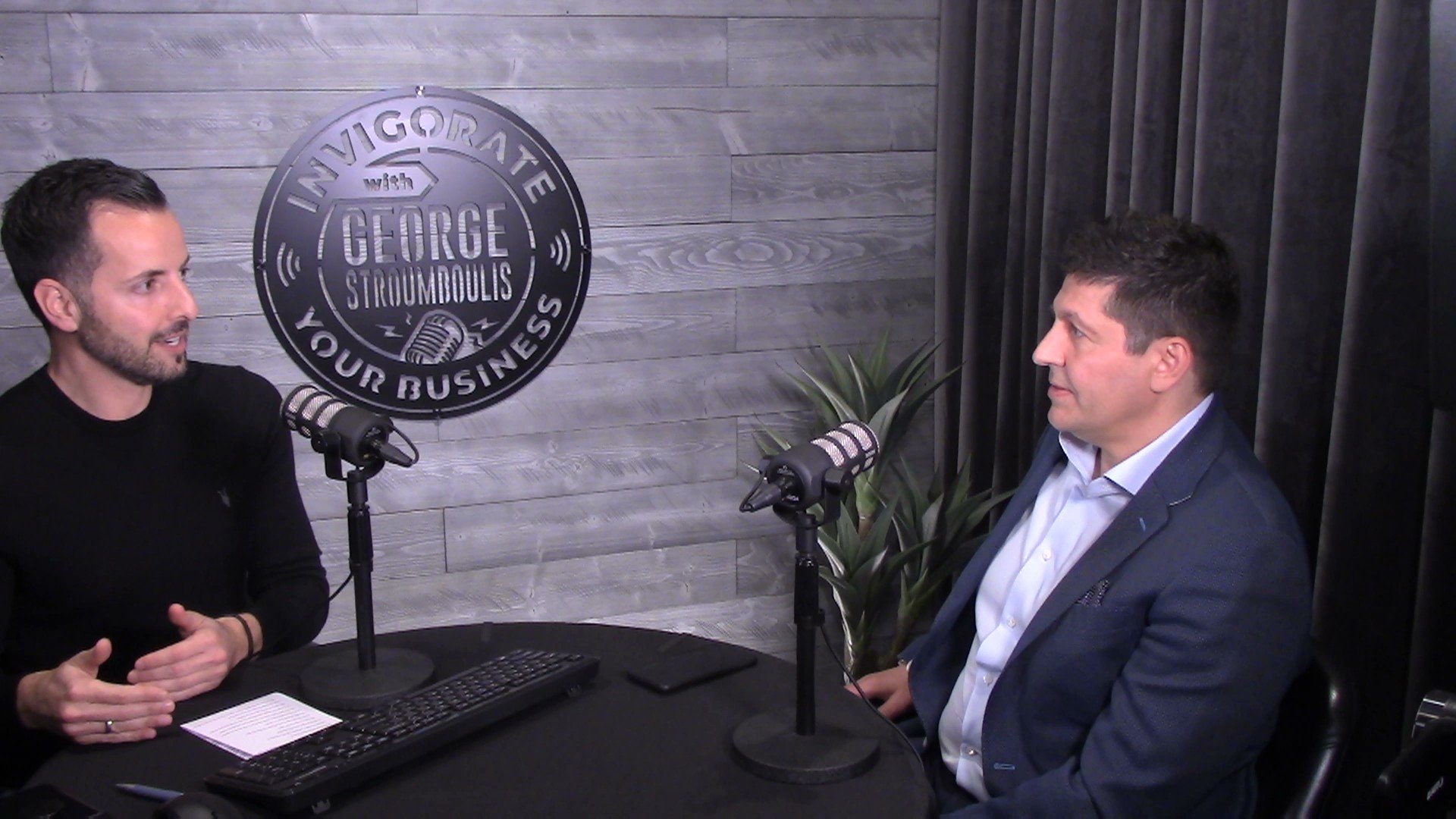

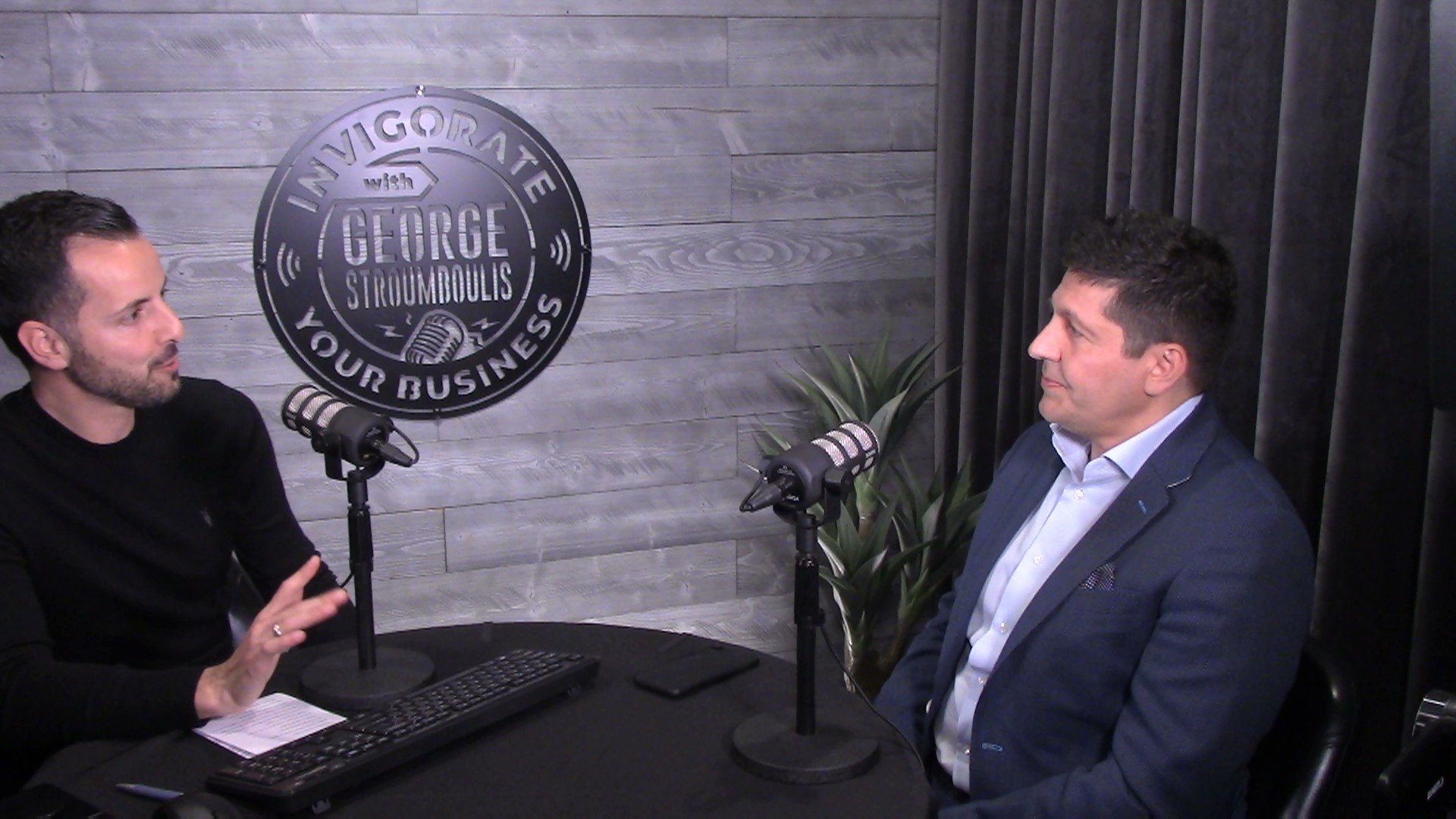
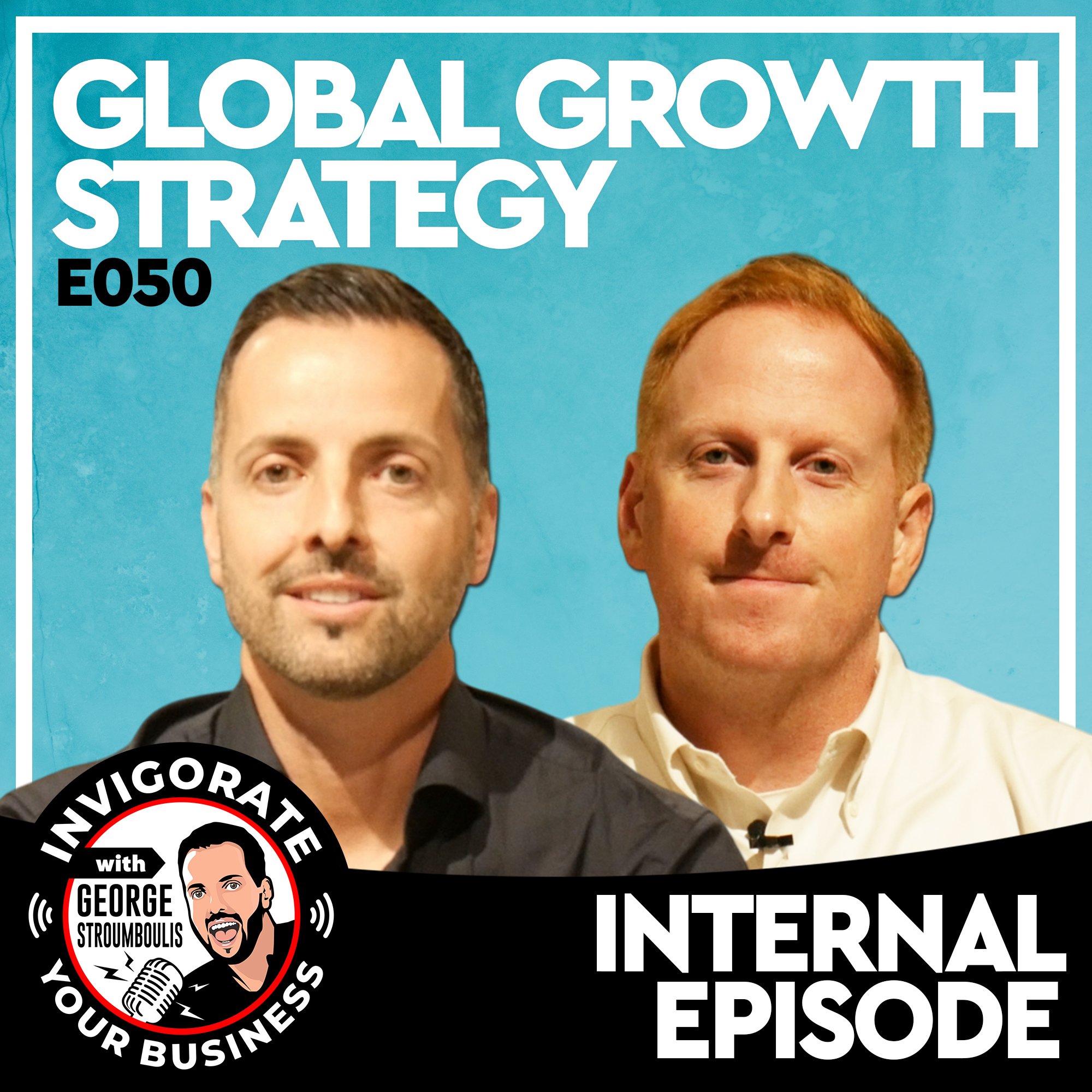



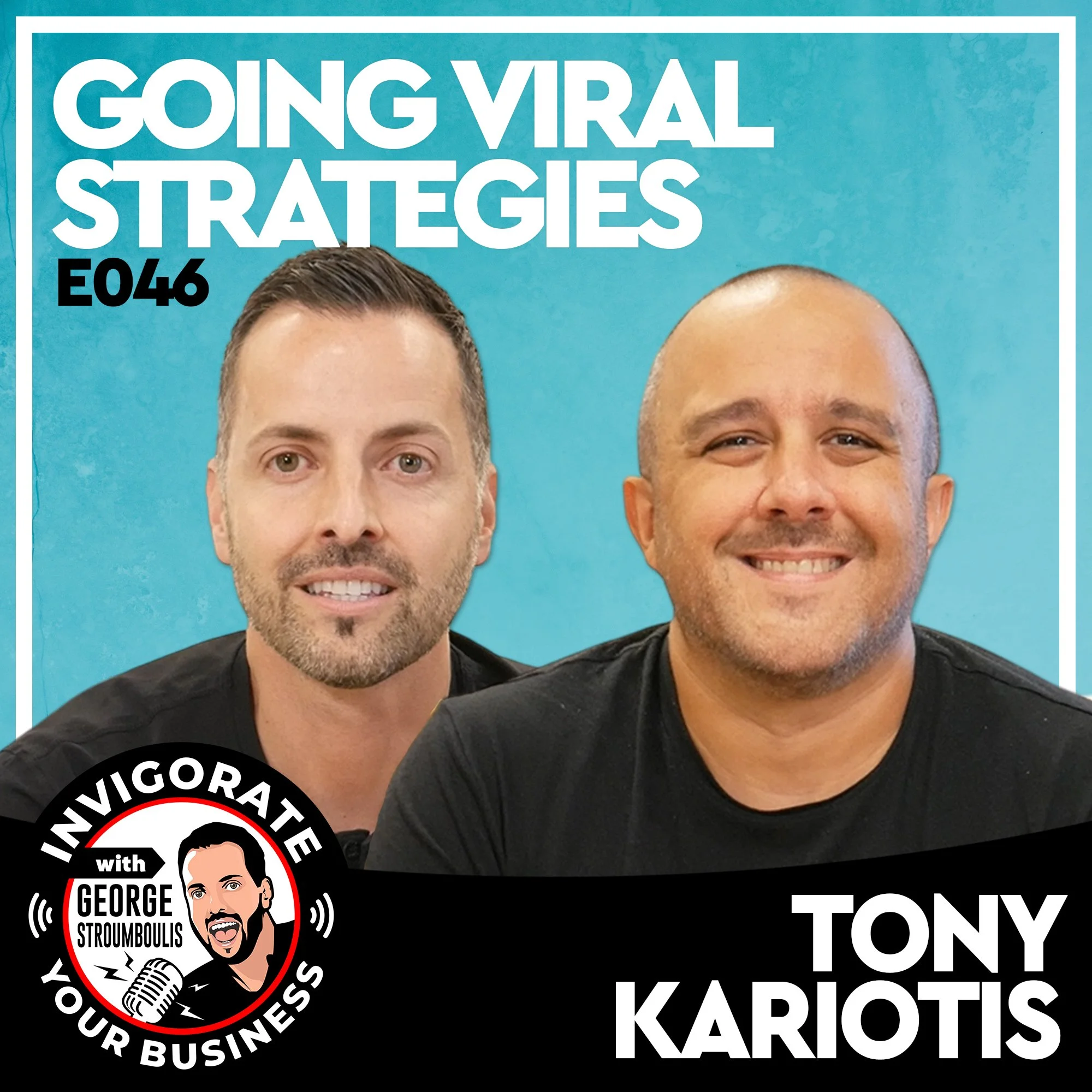

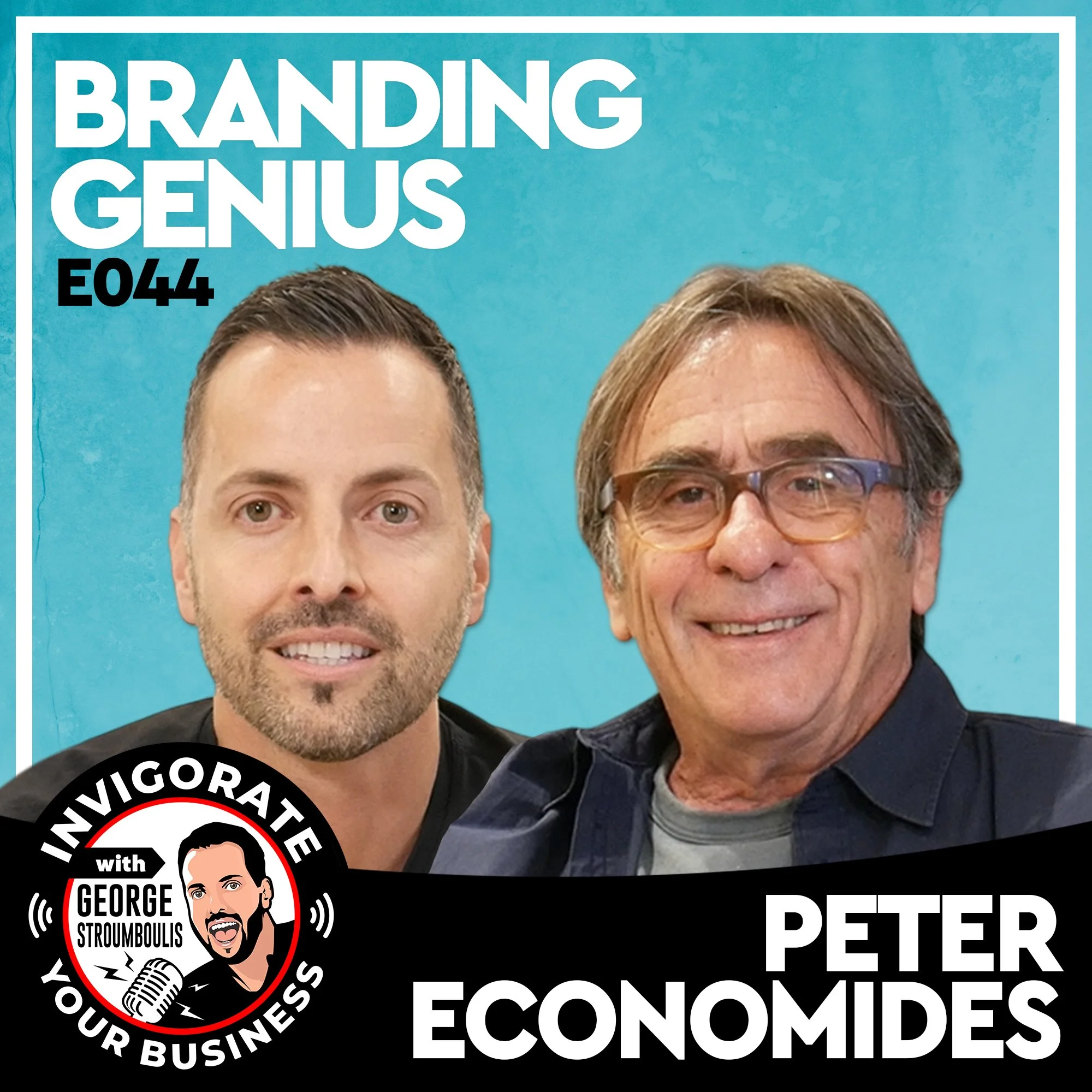
George Stroumboulis sits down with Jim Sogotis in Newport Beach, California on the Invigorate Your Business Podcast to talk about all things financial markets, investments, hedge funds, mutual funds, financial advice and so much more.